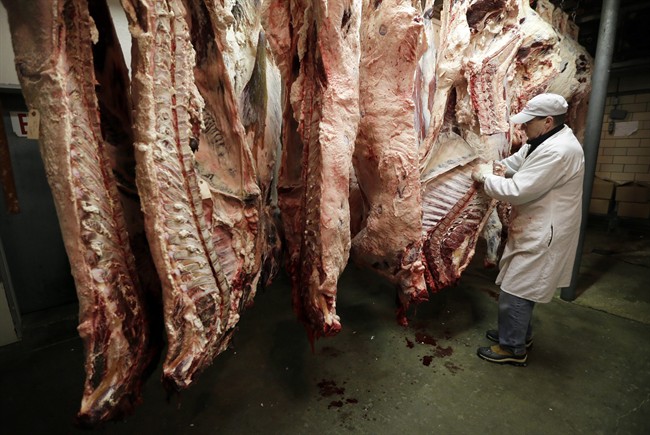EDMONTON – The union that represents Canada’s food safety inspectors says many of its members feel there aren’t enough front-line staff to ensure that rules designed to protect consumers are followed, especially in meat plants.

The risk is being amplified by uncertainty over changes being planned to the system by the Canadian Food Inspection Agency, said Bob Kingston, president of the Agriculture Union.
“Inspectors worry that a major food-borne illness is on the horizon and with good reason,” Kingston said in releasing results of an online poll last month of 580 agency staff.
READ MORE: Scientists want you to know about an overlooked bacteria in meat
The Abacus Data survey of inspectors was commissioned by the union. It indicates just over half who responded believe the staff shortage is affecting food safety.
The problem is more pronounced in meat plants, with seven out of 10 inspectors saying there aren’t enough people on the job to ensure that the standards are followed.
About 70 per cent of those surveyed worry Canada is likely to face a major food borne illness due to food safety shortcomings.
The results are the latest salvo by the union in a battle over staff shortages.

Get weekly health news
“The food safety system is already bare bones. It’s working at minimum levels with no slack built in. Going below these minimums exposes consumers to an uncharted risk, and that should be a concern to everybody.”
Kingston said it was important to reinforce the message because there is widespread confusion as the agency prepares to overhaul the food inspection system for the second time in less than 10 years.
The last round of changes in 2007 gave food companies more responsibility for documenting their safety practises.
READ MORE: US meat inspectors identified sanitation issues in Canadian plants in 2014 audit
The changes led to meat inspectors spending more time reviewing company records than watching meat plant employees and operations, he said, noting the 2008 listerioisis outbreak involving cold cuts at a Maple Leaf Foods plant in Toronto. The bacteria made 56 people sick in seven provinces and 21 people died.
An E. coli outbreak in 2012 linked to beef from an XL Foods plant in southern Alberta made 18 people ill.
Kingston said food inspectors are still waiting for details of the changes expected later this year which are to include a greater emphasis on electronic record keeping.
“Not all of what they are taking about is negative, it is just you don’t do it when you have a skeleton crew,” he said.
“The concern is that there is going to be a lot of things fall through the cracks.”
READ MORE: Feds ‘playing Russian roulette’ with Canadians’ food safety, opposition says
The union said the previous Conservative government cut the agency’s annual budget by $56 million.
During the federal election campaign the Liberals promised to bolster spending on food safety inspections by $80 million over four years.
Kingston said the union will be watching when the federal government tables its budget next week.
“The front lines have been starved so this promise of the Liberals to put money into CFIA inspections is a big hope.”
BELOW: Agriculture Union CFIA Membership Study

Comments